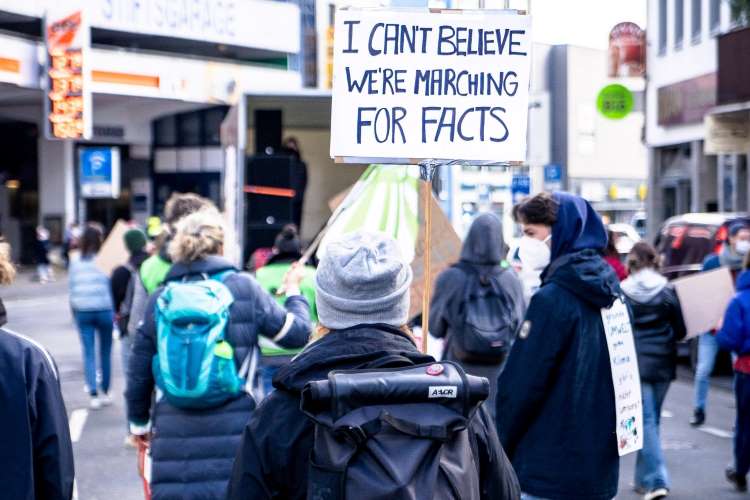The threat of false narratives and misinformation: The age of information, the spread of technological accessibility and the increased digital presence of citizens have empowered popular narratives in building and influencing political opinion. The stories around the causes of the Covid-19 pandemic, NATO narratives of the Ukraine conflict and the resounding victories scored by the ruling party in state elections stand testimony to this. The logic that backs the notion of ‘storying the world’ is grounded in imitating individual behaviour, leading to the adaptation and expression of political identity, perspectives and ideology.
The examination of political discourse over years shows that it relies on narrative patterns. Great stories, gripping drama and believable historical accounts have influenced individual and collective decision making. Political, economic, social and spiritual narratives are instrumental in the concept of society. However, the realities of post-election situations and pro-plutocratic policies have proven the problematic role of popular narratives and their impact on political misinformation. The point of contention here is the issues arising from false narratives which distort political opinion by means of misinformation and prevalent asymmetries.
READ I Higher education: How to benefit from NAAC data, analysis
The Covid-19 pandemic
Throughout the pandemic, misinformed narratives were facilitated out of prevalent fear in the absence of scientific information about the disease. The stories around the possible consequences of vaccination went viral with the growing availability of vaccines. This created fear, obstructed the dissemination of information and delayed the achievement of universal vaccination. It is unfortunate to witness this in a nation with a literacy rate of about 70%.
Education does not seem to contribute in curbing the spread of false narratives. With the highest growth of internet users in 2019, India does not seem to be directing its huge digitally connected base of citizens towards informed decision making. During health emergencies, fact-based narratives would help successful public planning. However, public planning needs to factor in the scope and spread of misinformed narratives.
READ I Work from home to work from anywhere: How Covid-19 revolutionised workplace
Democracy in the age of false narratives
Consider the picture of electoral campaigning in India. The notion that “facts don’t care about feelings” seems to be relevant here as fabrication and intelligent articulation of alternative realities can actually influence emotions and decisions. While becoming the largest democracy in the world, India has failed to value democratic opinion.
A country with severe structural and functional flaws like high relative illiteracy, a less progressive culture, poverty and unemployment limit the scope of informed and unbiased political decisions. They increase the scope of narratives playing a role. The frivolous attitude of the governments characterises the political benefits accrued through mispresented narratives.
Adding to this, the advent of social media and increasing smartphone penetration have helped such narratives go viral. False narratives are woven into the dimensions of society, region and space, hampering democratic thinking and the dissemination of information. Precarious is the phase where extreme narratives are busy adapting and are spreading a tendency of non-alliance. This often demands nihilation and considers it the sole solution in the absence of mobility and exchange among ideological narratives.
READ I Widening inequality: Societies need to address economic, ethical dimensions
Role of counter-narratives
The narratives that influence popular political opinion are overtly exogenous and at times contradictory. In the interplay of narratives and counter-narratives, however, the desired information stands passive. In the strategic game of narration in the pre-election period, marginal addition of participants to the banner is considered as victory.
The scope of counter-narratives is better in exerting influence in the case of fact-based economic narratives against false narratives. However, economists and technocrats appear divided in terms of their opinions concerning particular issues. Such noisiness of narratives leads to confusion that makes fact-based narratives less attractive compared with fabricated ones. Evidently, the role of counter-narratives is crucial. Even more crucial is the individual and institutions. Weaving the narratives in the minds of the masses can influence political decisions.
Policies for informed decision making
Narratives are operationally embedded in the societal structure. They evolve over time and are molded as per needs. They are essential to political communication and individual interactions on ideas and ideologies. However, there is scope for policymakers to step in rather than being fence-sitters. A strategy for monitoring and screening of false narratives through digital spaces is essential in ensuring their quality and truthfulness. Individual attempts towards valid narrative promotion deserve encouragement. Legal provisions against misinformed narratives are equally important.
The spread of popular opinion based on facts demands collective efforts. To achieve this, extensive use of digital means to ensure the speed and accuracy of valid information is inevitable. An independent agency to monitor and regulate political information dissemination is needed, considering the limitations of the election commission.
It is crucial to understand that ensuring the spread of valid narratives can also infringe on personal liberty and privacy. The scope for political misuse is prevalent in a centralised system of screening and monitoring. However, irrespective of the presence of such unavoidable contradictions, informed political decisions backed by valid political decision making is the essence of the formation of popular opinion.
(Kaibalyapati Mishra is a research scholar at the Centre for Economic Studies and Policy, Institute for Social and Economic Change, Bangalore. Views are personal.)

